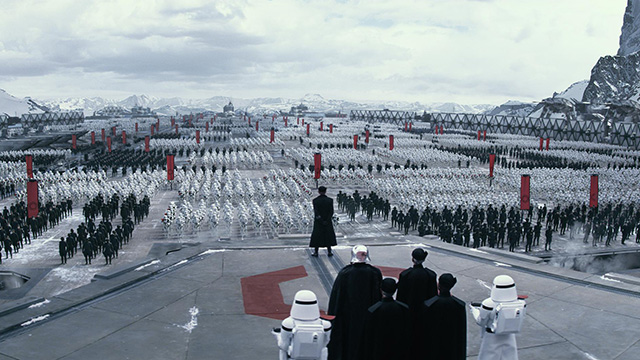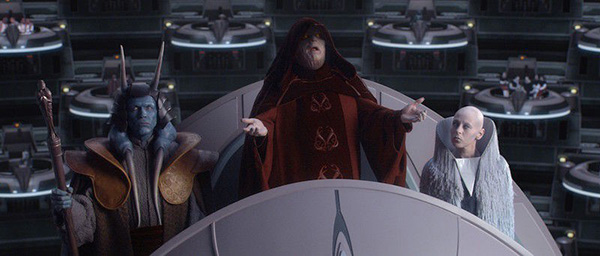The Road to Galactic Serfdom: War, tyranny and terror in the first two Star wars trilogies
Friday, December 18, 2015 by: Natural News Editor
Tags: Star Wars, Sith, dark empires

(NaturalNews) Star Wars: The Force Awakens hits theaters this week, continuing the cinematic saga of an interplanetary civilization's struggles with galactic war and tyranny. It will be watched by millions whose own civilization is beset by global warfare, driven by a planetary empire on the verge of descending into a militarized police state. So, now would be a good time to review the lessons to be found in the first two Star Wars trilogies concerning the road to universal serfdom and how to keep off it. (Story by Dan Sanchez, republished from original.antiwar.com.)
The story of how the Galactic Empire arose is told in the prequels trilogy. The whole process is orchestrated from within the Galactic Republic by Palpatine, a seemingly benign politician who is secretly Darth Sidious, grand master of the Sith, a power hungry order of mystic warriors wielding the dark side of the Force. The Sith are a dark reflection of the Jedi Knights, who use the Force to protect life and in service to the Republic.
 Sidious is the "phantom menace" who, aided by his apprentice Darth Maul, covertly manipulates the galaxy's republican government to progressively increase his own power, steadily advancing toward a total Sith coup. Just as with real life democracies, the Galactic Republic masks the machinations of the true wielders of power with the facade of "representative government" and drapes their seizures of still greater power with the sanctifying mantle of "popular sovereignty." The Sith can be seen as an analogy for the deep state.[1]
Sidious is the "phantom menace" who, aided by his apprentice Darth Maul, covertly manipulates the galaxy's republican government to progressively increase his own power, steadily advancing toward a total Sith coup. Just as with real life democracies, the Galactic Republic masks the machinations of the true wielders of power with the facade of "representative government" and drapes their seizures of still greater power with the sanctifying mantle of "popular sovereignty." The Sith can be seen as an analogy for the deep state.[1]Sidious's implement of choice for accumulating power is war. His modus operandi is as follows. He first manufactures an interplanetary conflict and crisis, manipulating one side as Palpatine and commanding the other side as Sidious. He then engineers enhancements of his own power over the Republic, justifying them as regrettably necessary for decisively dealing with that crisis.
In Episode 1, as Darth Sidious, he commands the Trade Federation to blockade and occupy the planet of Naboo. Then as Senator Palpatine, he convinces Naboo's elected queen Padme Amidala to call for a vote of no confidence against the Republic's Chancellor after he and the Galactic Senate fail to come to the aid of her people. This paves the way for Palpatine's own election to the Chancellorship.
In Episode 2, as Darth Sidious, he organizes a secessionist movement and directs the separatist Confederacy of Independent Systems to build a massive droid army. Meanwhile, he also oversees the spawning of a vast army of clone troopers, bio-engineered for docility.

The Republic had been hesitant to raise an army to confront the secessionists. But after news breaks of the Confederacy's droid build-up, the Senate grants Chancellor Palpatine emergency powers, enabling him to enlist and deploy the clone troopers as the Grand Army of the Republic. Palpatine assures the Senators:
"It is with great reluctance that I have agreed to this calling. I love democracy! I love the Republic! Once this crisis has abated, I will lay down the powers you have given me."
In Episode 3, the fielding of the clone and droid armies has engulfed the galaxy in all-out war between the Confederacy and the Republic, with the Jedi leading the clone troopers into battle. This presents the opportunity for Sidious to issue Order 66, which activates the clones' bio-programmed "Protocol 66,"[2] under which they turn on and kill their Jedi commanders. (I will cover Anakin Skywalker's role in all this later in the essay.)
Finally, unhampered by the Jedi, wreathed with emergency powers, and backed by a perfectly obedient standing army, Palpatine declares himself Emperor with the following address to the Senate:
"In order to ensure our security and continuing stability, the Republic will be reorganized into the first Galactic Empire, for a safe and secure society."

All the steps in the Dark Lord's rise to total power were enabled by the crises of wars that he himself engineered. The overriding theme of the first trilogy is that the star wars engendered galactic tyranny. This is a perfectly realistic narrative motif, because it is merely an interstellar extrapolation of Randolph Bourne's insight that war is the health of the State.[3] The emergency-propelled rise of the Sith also fits with Robert Higgs's broader insight that crisis is the health of Leviathan.[4]
Indeed, throughout history, rulers, regimes, and power cliques (just like Sidious and the Sith) have dragged their countries into wars in order to acquire, shore up, and enhance their power. This power play almost always works, because war activates in indoctrinated adherents of a State what Randolph Bourne called the "herd mind"[5] : a sort of statist Protocol 66.
Terrorized by the menaces of war, and aroused by its prizes, State citizens react like a spooked herd or a ravenous pack. They become as docile as sheep or dogs (or Sith-bred clones) to their shepherds and masters in government, swarming to their feet and granting them sweeping emergency authority, just as the war-spooked Galactic Senate repeatedly empowered Palpatine. They yield their liberties, even to the point of renouncing their individuality (like how the imperial troopers were all clones of a single man). Under the exigencies of war, the people, as Bourne put it:[6]
"...proceed to allow themselves to be regimented, coerced, deranged in all the environments of their lives, and turned into a solid manufactory of destruction toward whatever other people may have, in the appointed scheme of things, come within the range of the Government's disapprobation. The citizen throws off his contempt and indifference to Government, identifies himself with its purposes, revives all his military memories and symbols, and the State once more walks, an august presence, through the imaginations of men."
As Higgs detailed, the expansions of state size and power that occur during a war or other emergency are generally scaled back after the crisis passes, but never all the way down to the pre-crisis level. Thus, the power of the state ratchets up with every war.
This is why governments pursue war, and why war eventually leads to tyranny, and ultimately to totalitarianism.
Empires are so enamored with the empowering effects of war, that they will often try to maximize the clash by, like Palpatine, deliberately provoking (or fabricating) attacks, arming future enemies, and aiding both sides in a conflict. Especially egregious in this regard has been the US empire.
The casus belli of the Mexican-American War (the Thornton Affair), the Spanish-American War (the USS Maine), World War I (the Lusitania and the Zimmerman telegram), World War II (Pearl Harbor), and the Vietnam War (Gulf of Tonkin) all involved engineered conflicts, deliberate provocation and baiting, deception, or outright fabrication on the part of the US.
The US armed the Soviets against the Nazis in the Second World War, then armed international jihadis[7] against the Soviets in the Cold War, and is now devastating the Greater Middle East under the pretext of fighting international jihadis in the Terror War.

The US sold weapons of mass destruction (WMDs) to Saddam Hussein's Iraq for use in invading Iran, while secretly selling arms to Iran at the same time.
To provoke a crisis which led to the first war on Iraq, the US green-lit[8] Saddam's invasion of Kuwait over an oil rights dispute, just as Sidious greenlit the Trade Federation's invasion of Naboo over a trade taxation dispute.
After having sold WMDs to Saddam, the US invaded Iraq again years later over then non-existent WMDs, as well as non-existent ties to the international jihadi movement that the US first built up.
And now the US is arming the new Iraq government to fight the jihadis of ISIS, while also arming the jihadis[9] fighting alongside ISIS in Syria.
And Washington has used every single war and crisis it has concocted to expand its global empire and justify the accumulation of greater power over its domestic subjects. Are you getting the picture yet? We are ruled by a power clique just as diabolical and ruthless as the Sith.
Read more at: Original.AntiWar.com
Sources:
[1] TheAmericanConservative.com
[2] StarWars.Wikia.com
[3] DanSanchez.me
[4] Mises.org
[5] DanSanchez.me
[6] Fair-Use.org
[7] DanSanchez.me
[8] ForeignPolicy.com
[9] DanSanchez.me
Star Wars at FETCH.news
Get independent news alerts on natural cures, food lab tests, cannabis medicine, science, robotics, drones, privacy and more.
Take Action: Support Natural News by linking to this article from your website
Permalink to this article:
Embed article link: (copy HTML code below):
Reprinting this article:
Non-commercial use OK, cite NaturalNews.com with clickable link.
Follow Natural News on Facebook, Twitter, Google Plus, and Pinterest
- European Court of Justice: Healthcare professionals who promoted or administered COVID-19 vaccines are CRIMINALLY LIABLE for any harm caused
- Oncologist warns of ‘terrifyingly aggressive’ cancers in children, linked to immune suppression from COVID vaccines
- Newly released JFK files reveal Pentagon's role in creating Lyme disease and covid in the same lab
- Britain’s descent into police state censorship: Parents raided for questioning their daughter’s school system online
- Ancient kitchen secrets REVEALED: How garlic, ginger and green onions fight cancer and heart disease
- DARPA: The shadowy innovator behind the world’s most advanced military technologies
- NIH study, buried for decades, reveals that Flu Shots INCREASE elderly deaths, not prevent them
- COVID-19 scandal linked to CANCER SURGE: Billionaire researcher sounds alarm
- “Old Man in a Chair”: The COVID-19 pandemic was a carefully orchestrated scheme for global control
- Decentralize TV: Dr. Leonard Coldwell reveals shocking, heavily censored truths about CANCER, healing and the medical mafia complex
- Cinnamon plays a critical role in diabetes management
- Musk targets “strangely wealthy” lawmakers in DOGE probe, names Pelosi, McConnell, Schumer
- Utah governor allows ban on LGBT pride flags in public buildings and schools, will take effect without his signature
- RFK Jr. is reforming Americans’ health: A shift in power and paradigm
- FRAUD ALERT: Details DEMOCRATS do NOT want you to know about the $40 BILLION wasted on Fed-loaded credit cards cancelled by DOGE
- Scientists unveil breakthrough method to eliminate "Forever Chemicals" from water, transforming waste into graphene
- Massive egg substitution recall: Bleach contamination sparks nationwide concern
- Postcard from 1875 highlights smallpox vaccine’s failure: Lessons for today’s COVID-19 response
- Newly released JFK files reveal Pentagon's role in creating Lyme disease and covid in the same lab
- CDC finally halts $11 billion COVID funding scam as health officials admit the ‘pandemic’ was a fraud
- Analysis: The coming economic collapse, a mass uprising and Trump's three secret weapons to halt the growing revolt
- Kiss Your Genetic Privacy Good-Bye! 23andMe Gets Green Light to Sell Your Intimate Genetic Details to Anyone They Want
- Dr. Suzanne Humphries makes bombshell appearance on Joe Rogan podcast, exposing vaccine industry deception back to POLIOMYELITIS
- DEADLY DECEPTION: How COVID vaccines increased mortality rates and why authorities hid the truth
- Woman contracts WORLD'S DEADLIEST VIRUS after unknowingly being given the WRONG VACCINE
- Oncologist warns of ‘terrifyingly aggressive’ cancers in children, linked to immune suppression from COVID vaccines
- Here are TEN all-natural ways to protect your garden without using harmful chemicals
- Black cumin seed oil emerges as a powerful ally against breast cancer and chronic inflammation
- The hidden dangers in your kitchen: How cooking methods impact diabetes, cancer and aging
- Trump's greatest betrayal so far: Accelerating Middle East wars, silencing dissent, and serving Zionist masters
- Senate Democrats deny censorship industrial complex existed, defend government's role in silencing dissent
- Sugar-free deception: Artificial sweeteners hijack hunger signals, fuel obesity epidemic, study warns
- “Independent” anti-Russia outlet MEDUZA faces COLLAPSE as US funding dries up
- NIH study, buried for decades, reveals that Flu Shots INCREASE elderly deaths, not prevent them
- The Health Ranger releases “Vaccine Zombie” song and music video, using AI-animated zombies for the music video
- Discovery of vast underground city beneath Giza pyramids challenges human history
- Newly released JFK files reveal Pentagon's role in creating Lyme disease and covid in the same lab
- California's social media censorship law struck down: A victory for free speech or a threat to online safety?
- EPA advisor admits the agency is funneling billions to climate groups ahead of Trump’s return to White House
- The Health Ranger releases “Vaccine Zombie” song and music video, using AI-animated zombies for the music video
- Dr. Mike Yeadon releases 15-minute testimony - WATCH - about genocidal intent of COVID “vaccines”
- Florida takes a stand: DeSantis proposes permanent ban on mRNA vaccine mandates
- Mike Adams releases country western hit single: Goin’ Back in Time is Comin’ Home
- “Why we influenced the 2020 elections”: Facebook files reveal the coordinated effort to bury the Hunter Biden laptop story
- Unpacking the Lies That We’ve Been Fed – new song and music video released by Mike Adams, the Health Ranger
- House Intelligence Committee calls for the ARREST and PROSECUTION of Dr. Anthony Fauci
- The pandemic as a tool for INDOCTRINATION: Understanding “The Indoctrinated Brain” by Dr. Michael Nehls
- Rep. Nancy Mace introduces bill to ban biological males from female facilities on federal property
- Mike Adams releases music poetry sensation: A Child of God
- Sugarcane extract superior to cholesterol-lowering drugs?
- Survival 101: Effective EMF blocking techniques
- Michigan sheriff announces criminal investigation into 2020 election crimes, Dominion Voting Systems
- Peter Rost exposes Big Pharma corruption in his book “The Whistleblower: Confessions of a Healthcare Hitman”
- Migrants are taking advantage of recent hurricanes to scam residents and loot their homes
- Red Cross issues warning to stop blood plasma donations from vaccinated people
- Scientists confirm: GENIUS brain function can be spontaneously unleashed in humans without any apparent cause
- EPA advisor admits the agency is funneling billions to climate groups ahead of Trump’s return to White House
- HYSSOP: What research reveals about the health benefits of this ancient holy herb
- Two containers with completed ballots fall out of truck in Florida
- Fully vaccinated about to see “tsunami” of illness and death, warns virologist
- Global leaders unite to clamp down on “misinformation” with UN-backed Cascais Declaration
- BREAKING: 2025 NDAA authorizes mandatory military draft of WOMEN across America… as Pentagon pursues global NUCLEAR war with both Russia and China at the same time
- Michael Yon warns of a ZIONIST TAKEOVER in Trump’s second administration
- BOMBSHELL: DNA testing kits are a SCAM to develop ethnic-specific bioweapons
- Ozempic and Wegovy weight loss drugs are injectable LIZARD VENOM PEPTIDES that may unleash a devastating wave of organ failure… side effects align with symptoms of SNAKE BITES
- Israeli soldiers accused of even more torture and abuse in the West Bank
- These 13 countries just signed an agreement to engineer a global FAMINE by destroying food supply
- NASA admits that climate change occurs because of changes in Earth’s solar orbit, and NOT because of SUVs and fossil fuels
- RFK Jr. clears key hurdle: Sen. Susan Collins backs controversial HHS nominee, signaling a new era for health policy
- Sermon 30: How Jesus reveals Caesar’s FAKE CURRENCY and FALSE AUTHORITY
- Coriander seeds: Ancient medicine backed by modern science
- Arizona officials claim Maricopa County needs 10-13 days to tabulate results of the election
Science News & Studies
Medicine News and Information
Food News & Studies
Health News & Studies
Herbs News & Information
Pollution News & Studies
Cancer News & Studies
Climate News & Studies
Survival News & Information
Gear News & Information
News covering technology, stocks, hackers, and more



"Big Tech and mainstream media are constantly trying to silence the independent voices that dare to bring you the truth about toxic food ingredients, dangerous medications and the failed, fraudulent science of the profit-driven medical establishment.
Email is one of the best ways to make sure you stay informed, without the censorship of the tech giants (Google, Apple, Facebook, Twitter, YouTube, etc.). Stay informed and you'll even likely learn information that may help save your own life."
–The Health Ranger, Mike Adams












































